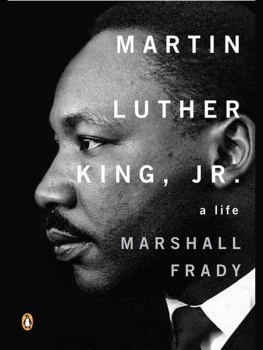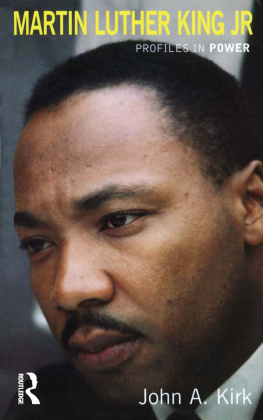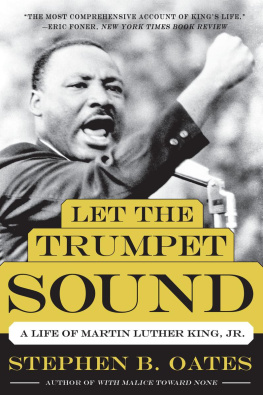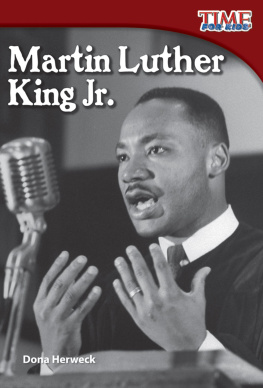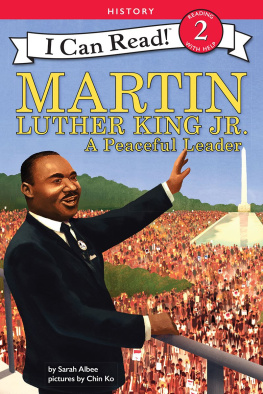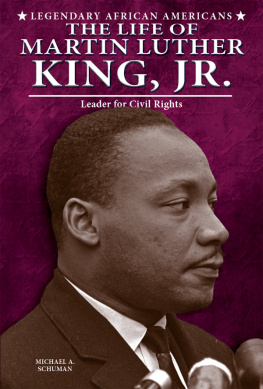VIKING
Published by the Penguin Group
Penguin Putnam Inc., 375 Hudson Street, New York, New York 10014, U.S.A.
Penguin Books Ltd, 80 Strand, London WC2R ORL, England
Penguin Books Australia Ltd, Ringwood,Victoria, Australia
Penguin Books Canada Ltd, 10 Alcorn Avenue, Toronto, Ontario, Canada M4V 3B2
Penguin Books (N.Z.) Ltd, 182190 Wairau Road, Auckland 10, New Zealand
Penguin Books Ltd, Registered Offices:
Harmondsworth,Middlesex, England
First published in 2002 by Viking Penguin,
a member of Penguin Group, (USA) Inc.
1 3 5 7 9 10 8 6 4 2
Copyright Marshall Frady, 2002
All rights reserved
Portions of this work appeared earlier in different form in The New York Review of Books, The New Yorker, and the authors Jesse: The Life and Pilgrimage of Jesse Jackson (Random House, 1996).
Excerpts from Letter from Birmingham Jail and I Have a Dream. Copyright 1963 Martin Luther King, Jr., copyright renewed 1991 by Coretta Scott King. These selections and those from other speeches, sermons, and a eulogy of Martin Luther King, Jr., reprinted by arrangement with the Heirs to the Estate of Martin Luther King, Jr., c/o Writers House, Inc., as agent for the proprietor.
ISBN 978-1-1012-2139-6
Set in Minion
Designed by Francesca Belanger
Without limiting the rights under copyright reserved above, no part of this publication may be reproduced, stored in or introduced into a retrieval system, or transmitted, in any form or by any means (electronic, mechanical, photocopying, recording or otherwise),without the prior written permission of both the copyright owner and the above publisher of this book.
Making or distributing electronic copies of this book constitutes copyright infringement and could subject the infringer to criminal and civil liability.
www.penguin.com
PUBLISHED TITLES IN THE PENGUIN LIVES SERIES:
Larry McMurtry on Crazy Horse
Edmund White on Marcel Proust Peter Gay on Mozart
Garry Wills on Saint Augustine Jonathan Spence on Mao Zedong
Edna OBrien on James Joyce Douglas Brinkley on Rosa Parks
Elizabeth Hardwick on Herman Melville
Louis Auchincloss on Woodrow Wilson Mary Gordon on Joan of Arc
Sherwin Nuland on Leonardo da Vinci
Nigel Nicolson on Virginia Woolf Carol Shields on Jane Austen
Karen Armstrong on the Buddha R. W. B. Lewis on Dante
Francine du Plessix Gray on Simone Weil
Patricia Bosworth on Marlon Brando
Wayne Koestenbaum on Andy Warhol
Thomas Cahill on Pope John XXIII
FORTHCOMING:
John Keegan on Winston Churchill Paul Johnson on Napoleon
Roy Blount, Jr., on Robert E. Lee Jane Smiley on Charles Dickens
David Quammen on Charles Darwin
Bobbie Ann Mason on Elvis Presley James Gleick on Isaac Newton
Kathryn Harrison on Saint Thrse of Lisieux
Robert Remini on Joseph Smith Hilton Als on James Baldwin
Ada Louise Huxtable on Frank Lloyd Wright
Thomas Keneally on Abraham Lincoln
Martin E. Marty on Martin Luther
Simon Schama on Oliver Cromwell
GENERAL EDITOR: JAMES ATLAS
For my father
Joseph Yates Frady
Preacher of the gospel for seventy years
A LMOST A GEOLOGICAL age ago, it seems nowthat great moral saga of belief and violence that unfolded in the musky deeps of the South during the civil rights movement of the fifties and sixties. Its hard to remember at this remove of years how profoundly the South then was like another country within the United States. Locked into its own massive apartheid system, implacably enforced by legal and political authorities across the whole spectrum of its social life, it really had more in common with the South Africa of that day than the rest of the nation. At the same time, the South seemed a region that belonged to some older, more primal and guttural script about the human situation, tribal, stark, fatal, that was wholly outside the general American sensibility of rationality and optimism. Even so, it had fallen the lot of the South, formed by slavery and its camouflaged sequel of segregation, to serve as the crucible for the whole nations periodic struggles of conscience over its own endemic and pervasive racial malaise. As early as Jefferson, the recognition was already gathering that the only fundamental and intractable crisis this Republic finally faced was that of racial schismthat the American political adventure, conceived in such brave hope and largeness of idea, may have also held from its very inception, when the first black man in chains set his foot on the continents shores, the seeds of its undoing. Indeed, that aboriginal crime has been with us, one way or another, ever since. And it was the South, living more directly and intimately in that crime than anywhere else, that seemed appointed the violent ceremonial ground for Americas intermittent travails to purge itself of that primeval shame and guilt.
The civil rights movement became the nations latest attempt to perform in the South an exorcising of its original sin, and it turned out our most epic moral drama since the Civil War itself. What was taking place for those few passionate years was a kind of high lyricism of the human spirit, played out in the unlikely stage set of bleak little cities and musty towns marooned out in the sun-shimmering backlands of the South. And for its duration, the South itself seemed to pass into a theater of the surreal. Over its countrysides could be found an exotic visitation of gentle young earnest evangels from the far winters of the North and the mild Eden of California, having brought down with them radical humanist fervors from Harvard seminars and all-night discussions in back of Berkeley bookstores, and now damp and tallow-pale in the brutal glare of Mississippi and south Georgia, they had about them a bespectacled, vegetarian, somehow sweetly lost and fugitive quality. With them were the brimstone-eyed young black circuit riders of the movement, Caribbean plantation hats rakishly tilted low over their faces and red bandannas tucked in the top of deerskin boots, dusting from town to town in ramshackle station wagons and muddy coupes, always furiously, manically, inexhaustibly talking.... They were days delirious with belief.
It was while I was working one summer in the mid-sixties as an apprentice correspondent in the Atlanta bureau of Newsweekstill a raw young provincial just emerged out of a Southern small-town upbringingthat I was lobbed abruptly into the heats and tumults of that immense folk morality play. One smoldering night in a little Alabama town, I found myself standing in the back of a shoebox tabernacle crammed with a congregation of black maids, janitors, beauticians, schoolteachersall the windows open to the hot ripe night outside and cardboard fans advertising Peoples Funeral Association fluttering over the packed ranks of glistening facesas a local preacher, a heavy, sweat-washed man just released from jail that afternoon, led them through one of those mightily swooping hymns of the movement: O freedom! O freedom! O freedom over me, over me.... I stepped outside to stand for a moment in the dark under a chinaberry tree, suddenly a bit woozy, and lighted a cigarette with trembling fingers. And with those voices in the church surging on in the nightAnd before Ill be a slave, Ill be buried in my grave, and go home to my Lord and be freeI still distinctly remember the prickling that shivered over my hide, and blurting aloud, Good God. Such moments were a kind of Damascus Road experience in the lives of more reporters than me.
And it would all converge repeatedly into the same, almost ritualistic scene: demonstrators brimming out of a towns black neighborhood and swelling down the plain little main street with a vast clapping and low cavernous choiring

